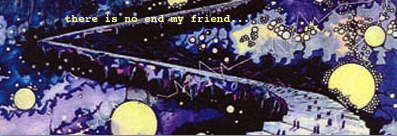31.10.13
30.10.13
28.10.13
27.10.13
25.10.13
24.10.13
19.10.13
18.10.13
17.10.13
15.10.13
14.10.13
13.10.13
12.10.13
9.10.13
8.10.13
7.10.13
6.10.13
5.10.13
4.10.13
Where is the new music? Did Internet killed creativity?
Machine should work. People should think (you wish). And IBM should make money.
(Raymond Scott on the electronic sound track)
P.S.: “popular music created in the industrialized world in the decade from the late 1990s to the late 2000s doesn’t have a distinct style—that is, one that would provide an identity for the young people who grew up with it. The process of the reinvention of life through music appears to have stopped. […] Where is the new music? Everything is retro, retro, retro.
[…]
But I have been trying an experiment. Whenever I’m around “Face-book generation” people and there’s music playing — probably selected by an artificial intelligence or crowd-based algorithm, as per the current fashion — I ask them a simple question: Can you tell in what decade the music that is playing right now was made? Even listeners who are not particularly music oriented can do pretty well with this question—but only for certain decades.
“Everyone knows that gangster rap didn’t exist yet in the 1960s, for instance. And that heavy metal didn’t exist in the 1940s. Sure, there’s an occasional track that sounds as if it’s from an earlier era. Maybe a big-band track recorded in the 1990s might be mistaken for an older recording, for instance.
“But a decade was always a long time in the development of musical style during the first century of audio recording. A decade gets you from Robert Johnson’s primordial blues recordings to Charlie Parker’s intensely modernist jazz recordings. A decade gets you from the reign of big bands to the reign of rock and roll. Approximately a decade separated the last Beatles record from the first big-time hip-hop records. In all these examples, it is inconceivable that the later offering could have appeared at the time of the earlier one. I can’t find a decade span in the first century of recorded music that didn’t involve extreme stylistic evolution, obvious to listeners of all kinds.
[…]
“There are new styles of music, of course, but they are new only on the basis of technicalities. For instance, there’s an elaborate nomenclature for species of similar electronic beat styles (involving all the possible concatenations of terms like dub, house, trance, and so on), and if you learn the details of the nomenclature, you can more or less date and place a track. This is more of a nerd exercise than a musical one—and I realize that in saying that I’m making a judgment that perhaps I don’t have a right to make. But does anyone really disagree?
“I have frequently gone through a conversational sequence along the following lines: Someone in his early twenties will tell me I don’t know what I’m talking about, and then I’ll challenge that person to play me some music that is characteristic of the late 2000s as opposed to the late 1990s. I’ll ask him to play the tracks for his friends. So far, my theory has held: even true fans don’t seem to be able to tell if an indie rock track or a dance mix is from 1998 or 2008, for instance.”
(LANIER Jaron, You Are Not a Gadget: A Manifesto, New York: Alfred A. Knopf, 2010, pp.128-130)
Subscribe to:
Posts (Atom)
Archives
-
▼
2013
(251)
-
▼
10
(31)
- The Oracle - The Awakening (US, 1989)
- Tin Tin Mya - Hlat Pan Khwe Nwe (Myanmar)
- William Onyeabor - Love Me Now (Nigeria, 1979)
- Luc Ferrari - Petite symphonie intuitive pour un p...
- Glorious Strangers - Modern Life (US, 1983)
- Francis Bebey - Forrest Whistle (Daphni Edit) (UK,...
- Anthony Moore - ABCD Gol'fish (Germany, 1971)
- Henry Flynt - You Are My Everlovin' (US, 1981)
- Aldous R. H. - The Scorpion Swings (US, 2012)
- Kunnakudi R. Vaidyanathan - Mohanam (violin, India)
- Bill Orcutt - A History Of Every One (US, 2013)
- The Dead C - Polio (New Zealand, 1987)
- Roberto di Simone - La Gatta Cenerentola II° Coro ...
- Ed Askew - Moon in the Mind (US, 2008)
- Tino Contreras - Santo (Mexico, 1968)
- Tonetta - Man in Black & Super Meat Boy (Canada, 1...
- Mary Roos - Arizona Man (Germany, 1970)
- Metasplice - Churn (Germany, 2013)
- Edan - Echo Party (US, 2009)
- Rats - C'est Disco (Italy, 1981)
- Akbar Ramish - Seeya Chashmon Seeya (Afghanistan, ...
- Cleveland Eaton - All Your Lover, All Day , All Ni...
- Konono Nr.1 - Paradiso (Congo, 1995)
- Ensemble Shanbehzadeh et Matthieu Donarier Quatuor...
- Geomungo Factory (South Korea, 2012)
- The United States Of America - Cloud Song (US, 1968)
- Scott Fraser - A Life of Silence (US, 2012)
- Where is the new music? Did Internet killed creati...
- The Deep River Boys - Recess In Heaven (US, 1948)
- La Nouvelle Frontière - Pacification (Canada, 1970)
- Boobie Knight & The Universal Lady - April (US, 1974)
-
▼
10
(31)
